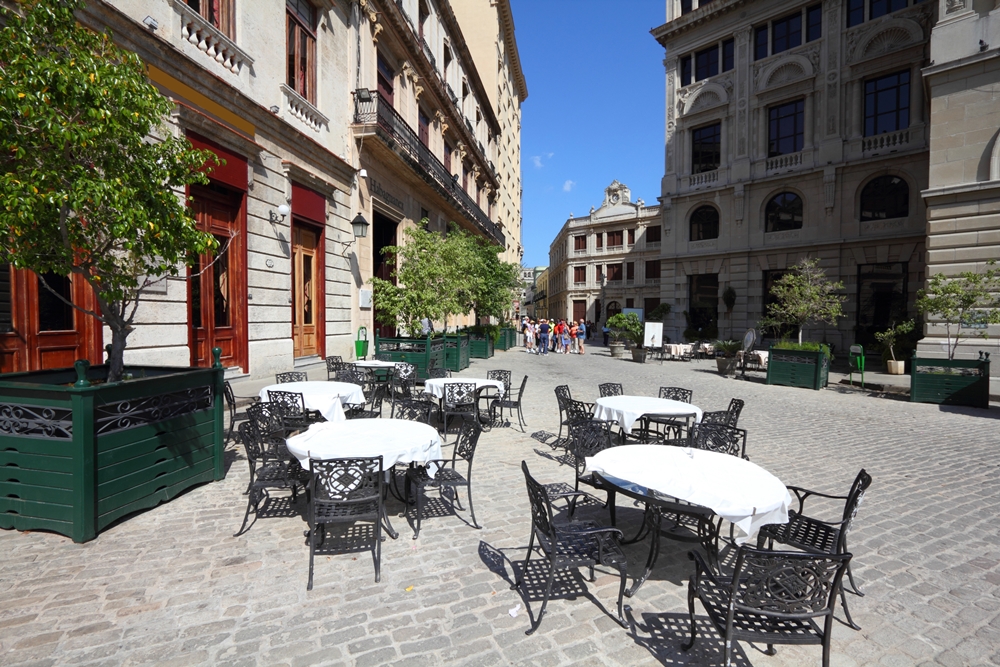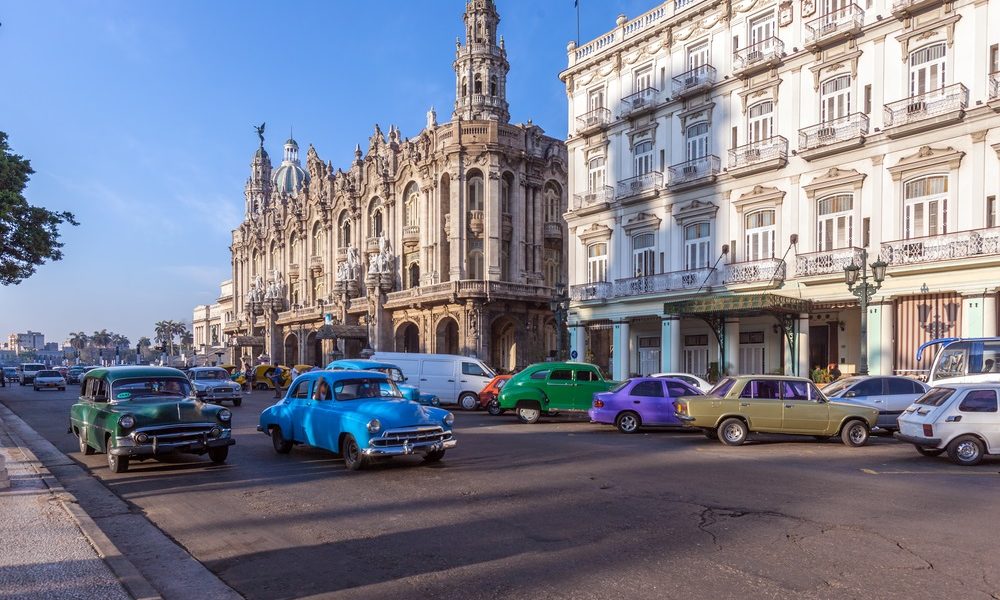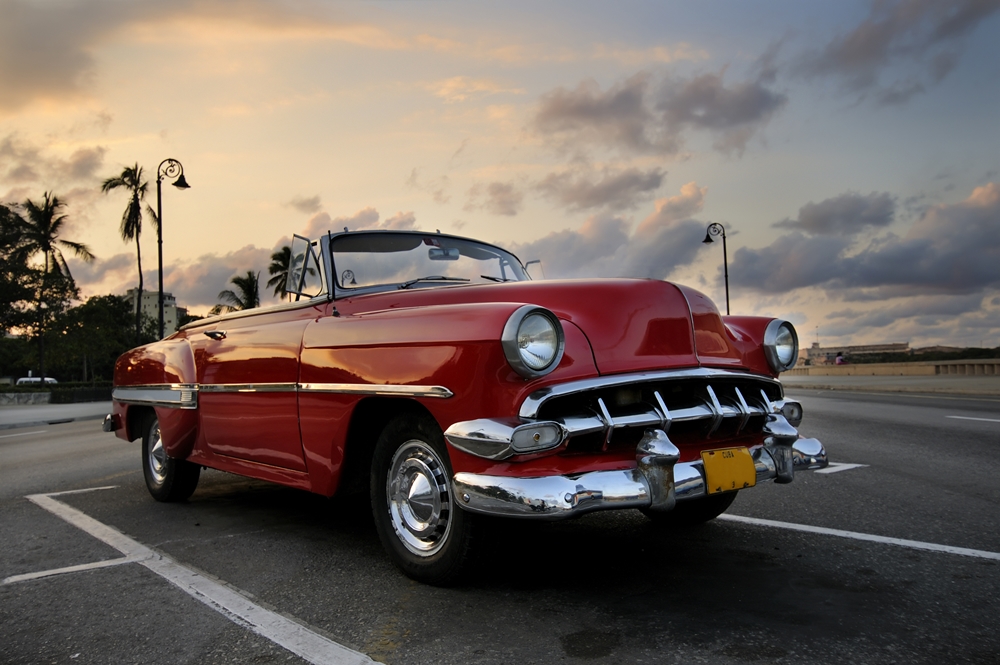So I’ve talked a lot about what to see and do in Cuba – from stellar night clubs to bargain markets – that we haven’t gotten the chance to talk about what it’s really like to travel in Cuba. It’s exhilarating, yes, and no doubt a once in a lifetime experience, but I’d like to give you a few practical tips. That way you can experience the best Cuba has to offer without any delays.
Just because we’re serious doesn’t mean we don’t ride in style – and you can too!
First off, money. There are two official currencies in Cuba: the Nacional Currency (Moneda Nacional or MN) and the Convertible Currency (CUC), which is known as the tourist dollar. During my time in Cuba, I never encountered the Nacional Currency, and I dealt with all clerks, shops, taxis, etc. in the CUC. Compared to the MN, it’s actually worth a lot more and all merchants are more than happy to deal in it. Unofficially, it’s actually worth 0.90 to $1 U.S. dollar, making it worth slightly more.
It is handy to know that 24 MN are equal to 1 U.S. dollar, and 25 MN equal 1 CUC. Having a few MN on hand is not necessary for most trips to Cuba, but when dealing with private salesmen or transportation it is helpful to carry MN with you as not all Cuba citizens deal in the CUC.
Because U.S. based debit and credits cards are currently not accepted by Cuban institutions, you will have to travel with hard cash for your arrival to Cuba. But once you’re there, you can easily exchange U.S. dollars directly for the CUC or MN at Cuban banks, airports, resorts, and hotels.
 Make sure to kick back and relax in Old Havana.
Make sure to kick back and relax in Old Havana.
Next, and generally the most important, food. Like most Spanish speaking countries, a Cuban meal relies on meat – largely pork – rice, black beans, and plenty of spices. There is always the famous Cuban sandwich of Swiss cheese, roasted pork, and pickles. Sad to say, for vegetarian travelers, Cuba is a tricky situation. Fresh fruits and vegetables are hard to come buy and very few restaurants provide vegetarian options.
One key tip I’ve learned from my tour guides is to always ask what is available at a restaurant, rather than ordering directly off the menu. Sometimes produce and meats run out, and no one likes to be that awkward customer rushing to pick a meal when the waiter is looming over you.
It is highly suggested that foreign travelers do not drink directly from the tap and purchase bottled water. For one, bottled water is convenient when traveling around a tropical island. But, for the most part, our stomachs are squeamish. Cuban water isn’t “dirty” or “unhygienic,” it’s simply foreign to the American stomach. So stick with bottled water to keep you hydrated and on your feet for the entirety of your Cuban experience.
Don’t miss out on a trip to the enticing Havana Rum Museum!
But if you’re looking for drinks to spice up your vacation, then you’ll definitely have to try out the local beer and the fabled Cuban rum. Mojitos and daiquiris are at their finest in Cuba, but if you want to get into the spirit of things, order a Cuba Libre, a lime infused cousin to the rum and coke. Expect a standard drink to cost 1-2 CUC, with your fancier cocktails netting you more. Though, for those prices, I don’t think anyone will complain.
And if you plan on drinking, you’re probably wondering how to tip. Generally, its the same as tipping in the U.S., with 10% being the minimum and 15% for satisfactory service. Of course, always tip based on your own satisfaction, but know that waiters, bartenders, and taxis drivers are always glad to earn an extra CUC. It is also considered good form to tip for a small amount for general services, like directions or, if you’re a car aficionado, taking a photo with a classic convertible.
Lastly, if you’re planning on traveling to Cuba anytime this Winter, say for the fantastic Havana International Jazzfest, dress down with shorts, a light Hawaiian button-up, and flip flops, cause it’s expected to be in the high 70s, making it a perfect escape from the cold!








Hey there, Tours4Fun team! I just read your latest blog post about Cuba travel tips, and I have to say it's excellent! As someone who has always been fascinated by the vibrant culture and rich history of Cuba, I found your tips to be incredibly informative and useful. Your post is well-structured and easy to read, making it a great resource for anyone planning a trip to Cuba.
I particularly appreciated your advice about money matters and communication. Knowing how to access cash and communicate with locals are two critical factors that can make or break a travel experience. I also loved the suggestions you provided for exploring Cuba's unique attractions, such as visiting Havana's vintage car scene and taking a salsa class in Trinidad. These tips not only offer a glimpse into Cuba's diverse cultural offerings but also provide travelers with an authentic experience that they won't find anywhere else in the world.
Overall, your post has made me even more excited to visit Cuba one day soon. I can't wait to put your tips into action and immerse myself in all that Cuba has to offer. Thanks again for sharing your expertise with us, and keep up the fantastic work!